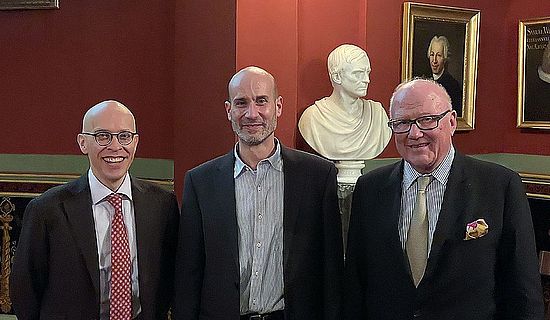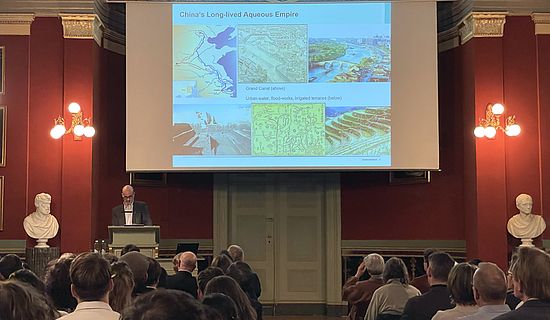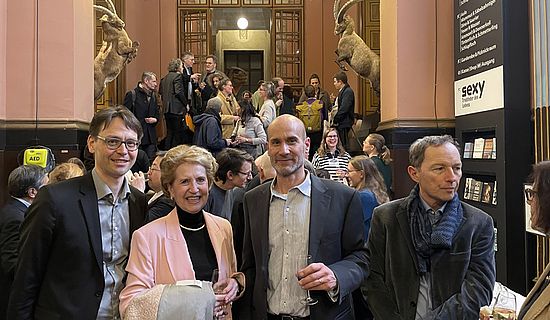/ News, Events, People
Prof. Dr. Corey Ross delivered his Inaugural Lecture



Prof. Dr. Corey Ross, Director of the Institute for European Global Studies and Professor of European Global Studies, delivered his inaugural lecture on 5 March 2024 at the Natural History Museum Basel. Titled "Water and Power in the Age of Empire – and Beyond," the lecture explored the legacies of 19th-century imperial water regimes into the present. The event drew a considerable number of students, faculty members, and the wider public.
Tuesday evening saw the inaugural lecture of Prof. Corey Ross, Director of the Institute for European Global Studies since June 2023, held in the sombre splendour of the auditorium of the Natural History Museum. Entitled Water and Power in the Age of Empire – and Beyond, Ross explored the overt as well as subcutaneous legacies of 19th-century imperial water regimes into the present. His lecture generated considerable interest, with a large attendance by students, faculty, and the wider public. Among the distinguished guests were Rector Prof. Andrea Schenker-Wicki, Vice-Rector for Education Prof. Thomas Grob, the president of the Stiftung Europainstitut Dr. Thomas Staehelin, the Chairmen of the Förder- and Alumniverein Christian Egeler, former Directors of the Institute for European Global Studies Prof. Georg Kreis and Prof. Madeleine Herren-Oesch, as well as the Dean of the faculty for Social Sciences and Humanities Prof. Martin Lengwiler. The latter opened the evening with his customary wit and aplomb, introducing the audience to Ross’s achievements in global environmental history.
The following lecture combined different threads from the history of infrastructure, environment, and imperialism and linked them to present day problems of geopolitics and resource management in the age of climate change. Ross centred his remarks around three case studies, each exploring a different facet of the imperial history of water. Firstly, drawing on the colonial history of the Ganges Canal and dam building projects in India, Ross explored the exercise of state power through control over water, which in turn allowed for power through water over people. Patterns of control, an uneven distribution of the benefits and disadvantages of these megaprojects, and cascading environmental problems continued from the colonial into the independence period. The lecture then explored the issue of water rights and contested state sovereignty throughout the Nile Basin, reified in the Ethiopian Grand Renaissance Dam and the brewing conflict between Egypt and its neighbours. Colonial-era agreements on water-rights have outlasted the economic and imperial interests that originally created them and have now contributed to a diplomatic stalemate. Finally, Ross considered a “history that never was”, in the shape of François Roudaire’s Saharan Sea project. Ross sketched how the echoes of colonial desiccation myths and the continuing human fascination with technical fixes for complex socio-economic problems have persisted since Roudaire’s time and taken modern shape in climate engineering projects in Lake Chad.
Taking these examples together, Ross expounded the persistence of imperial approaches to managing water in a notionally post-imperial world. Water has emerged as the ultimate constraint on economic growth, leading to an escalating, self-reinforcing cycle of turning natural systems into economic resources. The resulting dependency necessitates centralized management, exacerbating consumption, scarcity, and the need for even more control over water. Large-scale infrastructure projects may not warrant universal pessimism, but rather a constructive scepticism, as the mirage of a simple, technical solution all too often obscures the true complexity of social and environmental problems. Quoting the prescient Carl Ortwin Sauer (“We have not yet learned the difference between yield and loot. We do not like to be economic realists”), Ross closed by raising whether our unprecedented control over water will continue to meet our needs and whether we will be able to create more equitable conditions for using it.
The lecture marks an environmental turn for the Institute for European Global Studies, broadening its research agenda to include a seasoned practitioner of environmental and imperial history.
The event report was written by Paul Blickle, Assistant for European and Global History
Corey Ross is Director of the Institute and Professor for European Global Studies. His expertise focuses on the history of imperialism and global environmental history in the 19th and 20th centuries. His research on the socio-environmental history of Europe’s relations with the rest of the world builds on interdisciplinarity, investigates the global, transimperial and transnational circulation of ideas, goods and people, and aims to highlight perspectives that are relevant to major present-day and future challenges.



